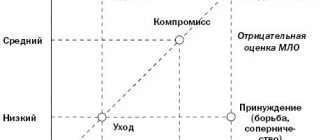Update on the site: we have created a social network/dating - ask an advanced audience about your Design and find people with any parameters in the map. Look..
In Human Design there is such a thing as the False Self. It literally means the process of suppressing your personality, when the inability to fulfill your own desires or other factors literally reshape you, transforming you into a completely different person. Millions of people live their lives under the yoke of the False Self without even thinking about it. Deep down in their souls they feel that they are deeply unhappy, but cannot admit it to themselves. After all, this will mean that they are doing something wrong, and the person is painfully afraid of his own mistakes. But no matter how scary or difficult it may be, everyone should learn about their weaknesses. And in this regard, the False “I” can be called our concentrated weakness, the place where all our fears and complexes converge.
The false “I” is an evolved herd instinct, when patterns imposed by someone else are perceived as the only possible truth. It is your mind's way of adjusting to the realities around you so that you can think, feel and act the same way as everyone else. This is the tendency to sacrifice one's own desires for the sake of not standing out among the rest of the crowd. It forces you to pursue false ideals, and it is not surprising that achieving such false desires does not bring any satisfaction.
To fight the False Self, you first need to learn to notice how and when exactly it manifests itself. As long as you deny or turn a blind eye to the problem, you are not an inch closer to solving it. And even if you now live in full accordance with your nature, it is not a fact that you will not be influenced by the False “I” later. Therefore, it is so important to study your “enemy” in advance in order to be ready to confront him at the right time.
Every person at a certain period of his life is faced with a choice: remain himself no matter what, or allow external pressure to dictate what he should be. Follow your true aspirations or try to fit into the general “picture” of society. Love and respect your real “I”, or cultivate a False “I” in yourself, ignoring your own desires. Despite the obviousness of this choice, most people still prefer to succumb to the influence of the False Self.
The circumstances that led to the loss of one’s personality can be very different. Someone was raised “under pressure” from childhood, and he was simply accustomed to sacrificing his interests for the sake of the interests of his parents. Some people consider their own hobbies to be too “strange” and are afraid of ridicule from society and people close to them. And others simply do not think about questions about their happiness - living their lives as if by inertia, they experience neither joy nor inner harmony. Most people use a “template”, hoping to find satisfaction in it. But only stress and discomfort in the soul are their constant companions.
And here it doesn’t matter what kind of person you are, what you do or what you believe. You will not be able to find the strength to be happy until you understand what exactly can make you happy. Chasing ideals and dreams imposed from outside, in the flow of life you may suddenly miss something very important for yourself, pursuing something that you have no business with. But the science of Human Design can help you find your destined creative path. You can stop looking at your life through the prism of public opinion and generally accepted standards, learning to accept your own uniqueness with all its consequences.
But achieving this is not so easy. The false “I” is a role that we adhere to under the influence of certain circumstances; over time, this role becomes an unconscious part of our personality. And the longer we live under the yoke of the False “I,” the more firmly this image sticks into consciousness and becomes the truth. This can be compared to a bad habit, which is difficult to get rid of, but necessary. Because the desire to associate yourself with what you really are not will only lead you to the fulfillment of other people's desires and hopes, which do not bring you any emotional satisfaction. It's as if you spent your whole life studying banking while your soul gravitates towards raising children. Even after decades, you will not be able to force yourself to love something you have no interest in, no matter how hard you try. And the echoes of real aspirations will echo in your life, sometimes causing you to experience the deepest feeling of melancholy and disappointment.
The false “I” is the tendency of the mind to place itself at the head of our personality, to attribute to itself power over our creative “I”. This is the habit of considering the image in which you perceive yourself to be the real embodiment of your personality. In fact, a mental prototype is nothing more than an illusion developed and nurtured by the mind. Each of us likes to attribute to ourselves those traits and qualities that we would like to have. Images of heroes from movies or TV series, friends, or just acquaintances - in each of those around us we see positive traits that we would like to “get” for ourselves. And all the qualities that are present in us, but cause our dissatisfaction, we, on the contrary, try to put away, so as not to disturb ourselves once again. And even if close people try to draw our attention to these manifestations of personality, we immediately perceive this with hostility, taking a defensive position. This is how we live - in a cycle of constant self-deception, not appreciating what we have, envying other people's merits. The Human Design System offers a solution to this problem.
The true embodiment of each person lies much deeper than the limited framework of consciousness. The mind will be ready to kindly provide you with dozens of “weighted” reasons why you need to act this way and why you shouldn’t do it differently. But happiness, harmony and peace of mind have nothing to do with the cognitive process. Try to remember when you were the happiest. When did you follow the voice of reason, or when did you act based on internal sensations? The real joy of life can manifest itself only in spite of the work of the mind, but not thanks to it. Thoughts give rise to thoughts, feelings give rise to feelings. So stop THINKING about how to find yourself and follow your FEELINGS.
According to Human Design, every person has a set of “basic” traits and characteristics that form the foundation of his personality. They are indicated in the Bodygraph - these are certain centers marked with shaded areas. There are also indefinite centers that are open to conditioning from the outside - this is the basis of the “I” of the False. If a person does not adhere to the Strategy and Authority intended for him, then the scales tip towards the False “I”, and he ceases to follow the path destined for him, sliding into social “traps”.
To be clear, Authority is an internal compass that points you in the right direction for decision making. Each person has his own Authority, according to whose advice his life should be built. This is your “self” in its purest form - incapable of dialogue in “human” language, it nevertheless has completely different methods for self-expression. Your task is to find a way to communicate with your Authority, learn to hear it and trust it.
A strategy is a behavioral complex formed according to your Type. There are 4+1 Types in total, each of which has its own, different Strategy. Ultimately it is simply a way of surrendering to yourself, surrendering to the flow of life, and allowing your Authority to guide you.
What is frustration?
We all have needs, ranging from the basic: food, water, warmth; ending with the highest: recognition in society, self-realization. At a certain point in time, individual needs become the most relevant and significant for an individual. He wants their satisfaction. However, this does not always happen. In this case, a state of frustration arises.
Definition of the concept
Thus, frustration is a psychological state characterized as a negative emotional state that arises due to a person not getting what he wants. It does not matter whether there is an objective obstacle to the goal or whether it is just a matter of subjective perception. For example, a person can take an action, but fear stops him.
Psychoanalysis interprets this concept as the result of a conflict between unconscious drives and moral standards. This phenomenon is present in the life of every person.
Hermit - Heretic
The role model of the Hermit – Heretic Profile is to be a leader. But loneliness often becomes the lot of strong personalities. Which, however, does not frighten you, but rather is a goal that you strive to achieve in any situation. Honor, dignity, and reputation are of priority importance for you, because with their help you gain unquestioned authority, which, however, allows you to keep a certain distance from society.
To succeed in life you need to focus on finding practical and effective solutions. Spontaneous and thoughtless actions can cause a damaged reputation, which for Profile 2/5 is comparable only to death. It's difficult for you to take action. Your subconscious part pushes you to new achievements, while the Hermit looks at what is happening around, painfully trying to understand why he needs all this.
But once you take action, you can move mountains, challenge society and achieve what you want, regardless of the price you have to pay for it. The main advantage of this role model is the fact that people always follow the owners of this Profile. At the same time, the person himself may not realize his own attractiveness and the degree of influence on others.
Causes of frustration
There are several approaches to classifying the causes of frustration. According to one theory, a person may not get what he wants due to:
- Deprivation. There are no funds to fulfill the need. A person is thirsty, but there is no source of water nearby and he cannot get to it.
- Losses. Previously, the need was satisfied, but then the resource ran out or was lost. A loved one was nearby, but died in a car accident.
- Conflict. A situation in which there are several motives and they contradict each other. A man is in love with a woman, but knows that she is married. His moral principles do not allow him to express his feelings openly.
From another point of view, the reason why frustration occurs is a barrier that prevents the achievement of a goal. There are several types of such barriers:
- physical (closed door, high wall);
- psychological (fear, self-doubt);
- biological (disease, weakness);
- sociocultural (traditions, norms of society).
However, the emergence of a barrier to achieving a goal or satisfying a need does not always cause depression, anger, or aggression. Factors that contribute to the aggravation of the situation include:
- Exceeding the endurance threshold. The need goes unfulfilled for too long or is too significant.
- A person perceives an obstacle as insurmountable and does not see the prospect of eliminating it.
These situations significantly increase the likelihood of developing a negative emotional state called frustration.
Manifestor's False Self - Anger
First, let's figure out what the classic Manifestors are. These are self-sufficient, independent individuals, always relying solely on their own opinion. They contain the imperious energy inherent in leaders of all stripes. Manifestors have the strength and determination to bring all their ideas to life, no matter how unattainable they may seem. This is the type of people who never accept other people's interference in their plans, and always act in their own way. They care about their own good (or those close to them) and do not allow anyone to stand in their way.
This is a rough description of an ordinary Manifestor following his nature. The first manifestations of the Manifestor side of character are noticeable from a very early age. Such children almost never ask their parents for permission and constantly do whatever comes into their head. They do not ask questions about what they can and cannot do, striving to do whatever they want. They do not need other people's advice and opinions - they want to gain their own experience, following their desires. And of course, such an anarchic position rarely meets with approval from the child’s parents.
Manifestor children are always sought to be shackled with control. They are watched twice as hard as other children, punished twice as much, and judged twice as harshly. Moreover, even when there may not be adequate reasons for sanctions. This is all due to the thirst for control among parents who simply cannot allow their children to do what they want. Adults are always firmly convinced that they know how to live “correctly” and try to forcibly instill this knowledge in the younger generation. And for the Manifestor child, such control becomes real torture, because blindly obeying other people’s instructions is contrary to his nature, but he cannot speak out against his parents. He has to carry these feelings within himself, and as soon as he begins to gain independence, he no longer allows anyone to dictate to others what he should do and how.
To one degree or another, every person does not like to obey other people's orders, especially if they go against his own opinion. But among Manifestors, under the influence of the False “I,” such anarchism is developed to the limit, and every attempt to interfere in their lives causes serious opposition. Having suffered from parental control since childhood, Manifestors are ready to give up any connections with people if they meddle in their lives. And they meet every attempt to interfere or at least suspend it with hostility, ready to adhere to their self-sufficiency to the end.
The anger of Manifestors is a side reaction of their hypertrophied independence. They dislike control so much that they prefer not to tell others about their plans at all, fearing that they will try to stop or detain them. Therefore, in most situations, Manifestors are more likely to immediately do what they have planned, without explaining their ideas to anyone. But in an attempt to avoid control, they are faced with the fact that control only increases. People around you may simply not understand why and why the Manifestor is doing something, and what consequences all this can lead to. And often Manifestors are put in such a situation that they are forbidden to continue doing what they have planned until they explain the meaning of what they started.
The result: a vicious circle where attempts to get rid of control become only a reason for increased control. And the more “independent” the Manifestor wants to be, the greater obstacles he will encounter on his way, the more anger and malice there will be in his life. Manifestors need to learn to tame their pride and begin to involve the people around them in their plans. This is not about asking for permission at all. If a Manifestor wants to change jobs, then he simply has to go up and tell his boss: “I’m going to quit on such and such a date for such and such a reason.” Then, having explained the situation, he will be able to leave work peacefully, without conflicts or disputes. But if he simply approaches his superiors with a statement and says: “Sign,” then he will most certainly have to enter into confrontation.
But there is another side to the False Self of Manifestors. Usually, when this Type is discussed, its ability to initiate is always mentioned. That is, he can do whatever comes to his mind, and he will always have excess energy to implement his plans. However, excessive control in the early years can literally “break” the Manifestor’s character, turning him into a weak-willed and fearful person who is afraid to start doing anything. When, instead of holding fate in his own hands, he deliberately gives his life to chance, hoping for a favorable outcome. This is the idea ingrained in the mind that any action will certainly be followed by a ban or punishment. Such a pattern can become so deeply ingrained in the head that it will manifest itself even unconsciously. It is as if instinctive fear scares the Manifestor away from any undertaking, and he would prefer to passively go with the flow.
It is much more difficult for such Manifestors to awaken their true nature, but it is still possible to do so. You just need to start trusting your inner Authority, and it will always tell you the right decision. This is a long experiment on your own life, which will require great determination.
The Cause of Frustration in Human Design Theory
Recently, one can often find mention of a new tool for understanding a person’s individuality. Human design, the false self, and frustration are inextricably linked within the framework of this theory.
From this point of view, under the influence of sociocultural restrictions, the so-called false “I” is formed - acquired behavioral strategies that are determined not by the true aspirations of the individual, but by the rules accepted in the social group. From childhood, society assigns certain roles to the child and imposes models of action. Which leads to suppression of the true “I”.
With the existence of such a structure as the false “I,” frustration is a constant phenomenon. A person is forced to renounce his own needs and subordinate them to social norms.
Human design suggests developing an individual body map, determining a person’s type and profile, and understanding oneself, one’s true self. As a result, eliminate the conflict between your true desires and imposed social roles.
Celebrities with profile 2/5
According to rough estimates, people with Profile 2/5 make up only about 2.5% of the total population on the planet. Among its owners are the following celebrities: Richard Gere, Robin Williams, Mark Twain, Kevin Costner.
Multifunctional astrological service
Of course, one article is clearly not enough to tell about all the nuances and features of the Hermit/Heretic Profile. We tried to reveal only the most important and significant points that will allow you to better understand yourself or your partner. In general, 2/5 is a very harmonious profile, which, if desired, can move mountains; all that remains is to find this desire and force yourself to act.
Manifestations and types
Frustration is an emotional state. According to many psychologists, it is directly related to anger. Depending on its direction, several types of this condition are distinguished:
- Anger is directed at external objects (those around them are to blame).
- Anger is directed at oneself (I am a failure).
- A person accepts failures, considers them inevitable, and the level of anger is minimal.
Aggression can be either systemic or manifest itself in the form of short but bright outbursts. It can take over a person who, before frustration arose, was not inclined to it.
The last model of behavior is the optimal and most constructive option. In this case, the person quickly overcomes a difficult situation and does not dwell on negative aspects.
In addition to anger, frustration of needs can manifest itself in the form of regression. In this case, frustration is a pattern of behavior in which an individual moves to a lower level of development. For example, an adult returns to childhood habits: crying, screaming, stamping his feet.
Motivation. 1st color: “Fear”.
A person with such motivation is driven by the desire for safety, the search for information to prepare for facing their fears and possible dangers. He is inclined to study in a group, where everyone is equal and shares information, or to study independently - when there is no pressure and there are no leaders. The mind of such a person likes the simple values that follow from collective interaction. This does not mean that this always happens or that it is preferable for him to learn; rather, such a concept helps to understand what tendencies a given person has in his behavior and recognize his inner strength. Such a person is confident when he has facts. He perceives life through the prism of safety and security, vigilant and careful.
The key to happiness: security.
Happiness for the mind is those moments when the bearer of the “Fear” motivation feels most protected. And vice versa - he is unhappy when survival is at risk. Risk in his life excludes happiness. The motivation of such a person will form a safe and stable foundation. The One is motivated by beginnings and the challenges that beginnings bring. One is the beginning of evolution.
If the mind is left, tones 1-3: Communalist.
Fear is closely related to survival and initiates awareness processes. The communalist seeks solutions in community action, integrates into society and community knowledge.
If the mind is right, tones 4-6: Separatist.
An individual who is approached as a source. For the most part, he is working on his personal capabilities; he needs personal space more urgently.
Replacing the “false self.” Need.
When the carrier of the motivation Fear is overtaken by frustration, a dead end in life, he begins to experience Need - a motivation alien to him. He is not sure what he needs to do to “survive”, he panics. He feels the need to do what he thinks is necessary, despite the details, potential problems - and then he lets down his guard. This state is similar to a panicker in a locked room, who walks in circles, thinking only about which door to open next, just to open it, to do something, to get what now seems necessary. This state is an indicator of the work of your false self, stop at such moments, remain inactive and become aware.
Consequences of frustration
The state of frustration is especially dangerous because it can gradually consume a person. A vicious circle is formed. Due to depression, the effectiveness of activities decreases, and even fewer needs are satisfied. Destructive emotions rage inside a person.
All this can lead to dramatic personality changes. There is a risk that the person will turn from calm and cheerful to aggressive and hostile. Or he will completely lose his incentive and interest in life and become apathetic.
In a condition such as frustration, aggression directed at oneself can cause the development of first feelings, and then a stable inferiority complex. A person stops believing in his own strength, in his ability to achieve results.
Such destructive tendencies are reflected in all aspects of life, destroying careers, families, and friendships. They cannot be ignored; this condition must be overcome.
Profile Child 2/5
Children of Profile 2/5 from birth suffer from the excessive influence of other people's expectations. What parents and friends regard as ordinary encouragement for such a child is perceived as severe pressure. In an effort not to lose face and not to disappoint others, children 2/5 overestimate their own strengths and, unnoticed by everyone, become disappointed in life.
Another important point for such a child is the desire for loneliness. Believe me, in such moments, kids with the Hermit/Heretic Profile do not need your worries and participation. They are comfortable and the only thing they want is to be left alone. When they want, they themselves will talk about their problems, or even continue to move forward as if nothing had happened.
Frustration Resistance
Not all people react to similar situations in the same way. Resistance to frustration depends on:
- personal characteristics;
- health status.
For a purposeful person with a strong character, a situation in which he failed to achieve his goal can spur him to action even more. He will not waste time worrying, falling into a negative emotional state, but will make additional efforts. But a passive or vulnerable individual can become deeply immersed in his emotional experiences.
A person in good physical shape always endures difficult psychological situations more easily. He has enough internal reserves for resistance.
On the other hand, inflated self-esteem is fertile ground for the development of a state of frustration. A person’s real capabilities do not allow him to satisfy overly ambitious goals and exaggerated needs. The likelihood of disappointment increases.
The False Self of the Manifesting Generator – Impatience
The Manifesting Generator is a symbiosis of the classic manifestation of the Manifestor and the Generator. The Manifesting Generator combines both positive and negative manifestations of both Types. As a Manifestor, he has the imperious energy to implement his plans, and as a Generator, he needs to seek “approval” from the Response from time to time, otherwise he risks getting bogged down in unfulfilling activities and worries. It’s quite difficult for Manifesting Generators, because they have to find a balance between contradictory manifestations of their personality. This is where the False “I” of this Type flows - impatience, when a person acts relying only on one side of his “I”, ignoring the other.
Each Manifesting Generator is a fairly active and purposeful person. He is always immersed in business and strives to make the most of every second. While doing several things at the same time, he does not lose focus on any of them, devoting enough time and effort to everyone. This is a kind of hyperactive people who have little or no need for rest and can get things done better and faster than other types.
It is worth remembering that the Manifesting Generator is a mixture of two Types. Therefore, in his life he can encounter both the anger of the Manifestor and the frustration of the Generator. But still, the main manifestation of the False “I” in his case is impatience. Being a very fast and capable person in his own right, the Manifesting Generator, however, cannot always cope with everything alone. And there are simply many situations when he will inevitably have to interact with other people, regardless of his attitude towards this. This is where impatience shows itself in all its glory.
What a Manifesting Generator can spend an hour on, other people will spend two, three or even four hours. And the representative of this “impetuous” Type himself may sincerely not understand how it is even possible to spend so much time on such a simple task. This gives rise to some arrogance and disdain for other people, the desire to do everything yourself simply because it’s “faster.”
The Manifesting Generator always strives to embody any thought that comes to mind immediately, without hesitating or stopping. And therefore, from time to time he forgets to listen to his Response, to find out his attitude to this. Having become too accustomed to a fast-paced lifestyle, the Manifesting Generator may ignore its need to temporarily stop while listening to the reactions of its Response. That's why he takes on dozens of things, starts them, and then leaves them unfinished. Simply because he didn’t really want to do it, and now there is no energy or desire to finish what he started.
The Manifesting Generator, like no one else, needs to cultivate exceptional patience. He must not only understand that he has incredible energy, but also be able to use it correctly. There should always be a pause between active actions so that there is time to listen to your Response. Otherwise, the Manifesting Generator will get bogged down in unfinished business and unfulfilled promises.
Diagnosis of the condition
As already noted, manifestations of frustration affect the effectiveness of activities and radically change relationships with others. Family members, colleagues, and acquaintances notice that something is wrong with a person, although they do not always understand the reason.
However, specialized psychological tests have been developed for more accurate diagnosis and selection of strategies to overcome the destructive state.
Thus, using the Rosenzweig frustration test, you can determine what type of reaction to failure a person is prone to. How will he behave if an obstacle arises on his way? The technique is projective in nature and suggests analyzing pictures and making a decision about the character’s behavior.
To quickly assess the situation, the Boyko Frustration Level Questionnaire is suitable. It consists of 12 questions and is extremely easy to use.
The optimal strategy is to contact a specialist who will select a set of methods for a comprehensive assessment of the situation and find effective ways to solve the problem.
Introductory part: Big Bang, neutrinos
Ra Uru Hu, who became so called in 1987, and before that Robert Alan Krakover (1948-2011), is the main character of this story, its founder, that same intermediary, “preacher”. As noted above, Robert heard a certain Voice that told him about how a person is created, how he is structured and what is the essence of life processes.
To understand this concept, we need to remember the Big Bang theory. Let us briefly recall: about 15 billion years ago, all the energy of the material Universe was concentrated in one small ball the size of a small fist. At some point, this energy ball collided with another object, as a result of which an immense flow of energy was released from the ball, which generated a huge number of particles. All these particles were mainly divided into two types, and hence, as Robert concluded, the fundamental principle of all living things is duality.
A significant place is given to the eastern wisdom of the I Ching, so Robert called these two types of particle families Yin and Yang. Moreover, Yin is truth, beauty, purity, charm, and particles belonging to the Yin family are quarks. Over time, particles traveling through the Universe cooled, including the sixth quarks, which formed neutrons and protons during cooling. What about Yang? And here there are particles - they are called leptons. Electrons were formed from leptons. Electrons interacting with protons and neutrons form an atom. This is how the atomic Universe was created.
Have you heard about neutrinos? Robert called this concept literally “the breath of stars,” because they are generated precisely by these cosmic bodies. These are small particles that permeate everything around us and ourselves in the amount of 3 trillion. almost at the speed of light, but we can neither see it, nor realize it, nor practically feel it.
In the already mentioned 1987, the death of one of the stars was witnessed in Latin America, as a result of which a large number of neutrinos were released. For 14 minutes, each of the inhabitants of the Earth received three times the volume of neutrinos than usually occurs (i.e., 9 trillion). Neutrinos have mass, and when they pass through us, they change us, to some extent program. And here we are gradually approaching the essence associated with human consciousness.
How to overcome frustration?
Overcoming frustration is much easier in the early stages. Some people are able to do this on their own, through introspection and self-hypnosis. For others, it is important to have the support of a loved one who is ready to help understand the reasons, accept them and help overcome obstacles.
If the negative state drags on, you may need the help of a psychotherapist. Different schools of psychology offer their own methods.
Positive psychotherapy aims to reframe the situation. The patient receives the specialist’s approval and support. Comes to understand that every person has value, regardless of achievements and failures.
The cognitive-behavioral approach is focused on identifying negative thoughts and turning them into constructive ones. This allows a person to successfully adapt to any events and avoid a state of emotional tension.
Existential experts call a person’s loss of meaning in life “existential frustration.” They help the individual regain meaning and also accept reality. Helps eliminate the negative consequences of the protective mechanisms of the individual’s psyche.
Almost every person in his life encounters examples of frustration, both in himself and in those around him. The most important thing is to find a way out of this state in time. Unfortunately, it is impossible to completely avoid failure. However, you should not take them too seriously and become immersed in negative emotions, then frustration will not be scary.
Motivation. 3rd color: “Desire”.
To better understand someone who is driven by Desire, imagine a blazing fire. Such a person wants to lead, he wants to become someone. And his desires are quite specific.
Such a person is happy to rule, spread his opinion and influence, and sometimes lead and influence the outcome of events. The carrier of motivation Desire can run a small business or be the head of a family, he gains strength when his authority is sincerely respected. Power can be offered to him from the outside or taken by him personally. On the other hand, society and people themselves can choose a representative of this motivation as a leader. Authority and leadership are needed to maintain order and provide direction.
The Key to Happiness: Ownership and Influence.
This motivation makes happy the one who does not play a secondary role, but actually establishes and maintains order. Such a person cares about social status and owning something - certain goods, houses, cars, etc. - that resonates with his personal value system. He will be unhappy when he is at the bottom of the social ladder, when he is controlled and dominated. By and large, Desire does not associate with power, but expresses, radiates and appropriates power. Desire is closely related to role fulfillment.
If the mind is left, tones 1-3: Leader.
Leadership is the desire to take a leadership role and guide others, take proactive action and be strategic while learning the right skills.
If the mind is right, tones 4-6: Follower.
A follower is a search for a course of action that, if followed, will lead to success and prosperity.
Replacing the “false self.” Innocence.
When the bearer of motivation Desire is overtaken by frustration, a dead end in life, he begins to experience Innocence and can simply give up and remain inactive. “I don’t want to do anything here anymore,” “This is leading nowhere,” “It’s time to burn bridges and give up everything.” Innocence implies that a person is disappointed, upset and no longer wants to develop in himself an activist, a leader and go in a specific direction. This state is an indicator of the work of your false self, stop at such moments, do not burn bridges and become aware.










